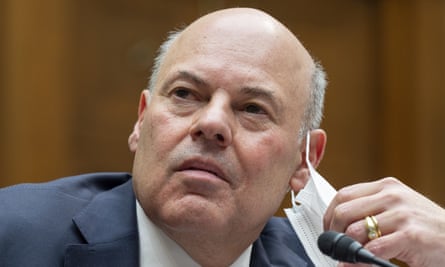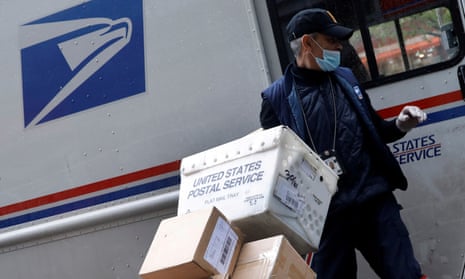The US postmaster general, Louis DeJoy, has drawn criticism over changes made to the US Postal Service since Donald Trump appointed him in May 2020, which have included delays in services, cuts and consolidation efforts, along with financial conflicts of interest.
These changes have continued into the Biden administration amid calls from unions, some elected officials, and progressive groups to oust DeJoy from his position, especially as in the pandemic, postal votes have become increasingly common and a core part of America’s democratic systems.
In March 2021, the USPS unveiled a 10-year austerity plan to improve the financial sustainability of the postal service, which includes implementing longer delivery windows, cuts to branch hours, consolidation and shutdowns of branches and facilities, and postage rate increases.
As well as fears over the efficacy of postal voting, the move has raised concerns over impacts on low-income Americans, rural communities and small businesses that rely on these services.
“The 10-year plan is a plan for privatization. It just doesn’t use the ‘p’ word,” said Porter McConnell, co-founder of the Save the Post Office Coalition. “It’s already happening. I think what they’ve discovered is that you can privatize without talking about it.”
The 1970 Postal Reorganization Act reorganized the USPS into a businesslike organization designed to rely on self-funding through revenue. A 2006 law mandated the USPS pre-fund health benefits for all retirees 75 years into the future, which has contributed significantly to financial troubles for the agency, which receives no government appropriations, unlike other government agencies.
“I think the reorganization of the postal service into something that both has a universal service obligation and has to break even was setting them up to fail,” added McConnell. “I don’t think we should be apologetic about a government service being provided where as a democracy it’s not in our best interest to have people in rural Alaska, for example, not be able to get mail service.”
As part of the 10-year plan, 18 mail processing facilities around the US were listed for closure in 2021, with plans to consolidate them into other regional cities.
In Cape Girardeau, Missouri, postal workers have held informational pickets to raise public awareness in opposition to the closures and consolidations, citing the impacts on workers and degradation in services as a result. The mail processing facility in Cape Girardeau is expected to shut down and be moved to St Louis next month.
Greg Davidson, president of American Postal Workers Union (APWU) Local 4088, explained the union had fought plans to consolidate all mail sorting operations to St Louis since 2011.
“All of these consolidations, they weren’t anywhere near as successful as what they would say. I would say they were actually disastrous,” said Davidson. “The mail has slowed down. They reduced the service standards.”
An audit by the USPS inspector general in 2018 found that slowing mail delivery in 2016 and 2017 resulted in just 5% of the savings the delays were projected to result in, and Davidson argued the decline in services resulted in lost revenue due to customers having to rely on different services because of the delays and consolidations resulting in mis-sorted mail.

Davidson said workers had already erroneously received truckloads of mail sent from the St Louis processing center to Cape Girardeau, resulting in delayed deliveries. He anticipates the issues worsening as 31 jobs are set to be eliminated with the mail processing consolidation.
Yet as service declines, prices have risen. In August 2021, the USPS implemented rate hikes of 6.8% for regular, first-class mail, 8.8% for package services, and a three-cent increase for a standard stamp. Starting on 9 January 2022, additional price hikes were implemented for priority mail services as part of the USPS 10-year plan.
The price increases have been criticized by union leaders as part of the postal service’s shift toward operating as a business rather than a public service, to the detriment of the public.
Kimberly Karol, president of the APWU in Iowa, says the increased reliance on private companies to handle mail parcels has led to delays in deliveries, with mail tracking disappearing for periods of time.
“This is the closest that we’ve ever come to actually being privatized,” said Karol. “We do everything we possibly can to make sure people get the mail in the way that they are expecting. The plans and the rules that are being put in place are making that nearly impossible for us to do any more and it’s heartbreaking. I’ve been with the postal service for 30 years. That’s a hard thing for us to come to terms with.”
In November, the Biden administration nominated two members to join the Postal Service’s board of governors, which has the authority to remove DeJoy from his position as postmaster general. Biden previously appointed three members to the board, while the remaining four were appointed by Trump.
Organizers successfully fought to prevent the Biden administration from reappointing Ron Bloom, a key ally of DeJoy, to the board.
Jamie Partridge, a retired letter carrier and organizer with Communities and Postal Workers United in Portland, Oregon, emphasized actions had been taken to push current members of the board to oppose DeJoy and the 10-year plan. Advocates for DeJoy’s removal are adamant removing him is necessary to steer the USPS toward reforms required to strengthen the public agency.
“Currently I feel like we have some momentum, with the possibility of gaining the majority that is against DeJoy and the 10-year plan, but there’s no guarantee of that,” Partridge said.
